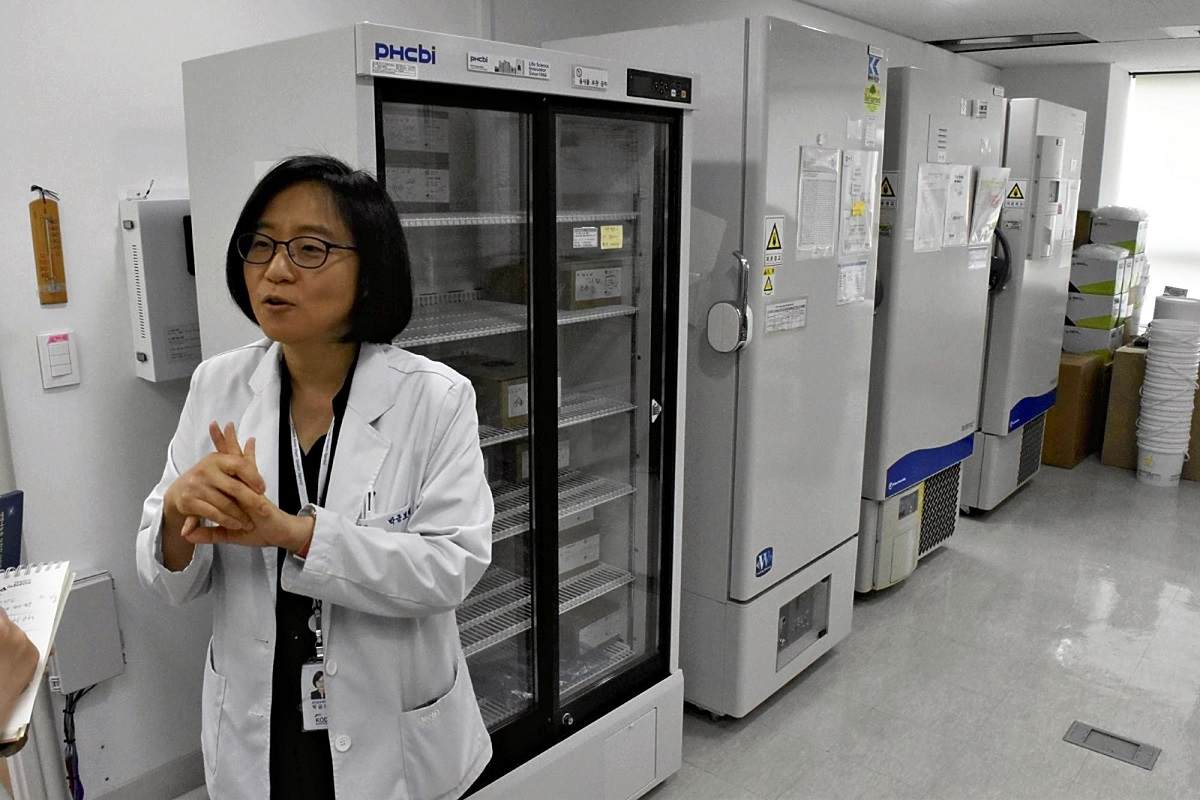South Korea’s Support for Hospitals Increases Number of Brain-Dead Organ Donors; Japan Lacks Such Systems

Director of a testing center operated by the Korea Organ Donation Agency explains the role of the facility on May 29 in Seoul.
20:00 JST, June 10, 2024
SEOUL/TOKYO — Organ donations from brain-dead donors have increased in South Korea as a result of a system for reporting patients who are possibly brain-dead to intermediary organizations, and heightened support for medical institutions that make such reports. Such systems are not available in Japan.
Samuel Lee, president of the Korea Organ Donation Agency (KODA), emphasized in an interview with The Yomiuri Shimbun that his country has a well-developed system to support organ donations from brain-dead patients.
In late May, a staff member looked into a microscope with a serious expression at a testing center operated by KODA in central Seoul. Since it started operations in 2014, the center has received blood from organ donor candidates from medical institutions that diagnose brain-death across South Korea. The center performs tests around the clock to determine if a patient is suitable to donate an organ — do they have an infectious disease, for example.
There is a limited number of medical institutions that are capable of performing such tests all the time, so the speedy work helps organ donations proceed smoothly in South Korea.
According to the latest data, there were 483 brain-dead organ donors in South Korea in 2023, far exceeding the 132 in Japan. The number of brain-dead donors per 1 million people in 2022 was about 10 times higher in South Korea than in Japan, according to statistics from the World Health Organization and others.
Donors began increasing in South Korea after the country introduced a system in 2011 that obliges medical institutions to notify KODA of patients who are possibly brain dead. It is legally mandatory, and a fine is imposed on medical institutions that are in violation. Along with the introduction of the reporting system, South Korea has implemented measures to support medical institutions that report information on such patients.
The testing center is one such measure. In contrast, the Japan Organ Transplant Network (JOT), Japan’s organization for arranging organ donations, does not have its own testing center and such examinations are conducted at external institutions.
KODA also has agreements with 76 medical institutions. After the organization receives a report, a coordinator based in one of locations visits the reporting medical institution and takes over organ donation procedures. The coordinator will meet family members of the brain-dead patient to confirm whether they will agree to a donation.
Lee Kwang-Woong, professor at the surgery department at Seoul National University Hospital, said, “Medical institutions that have agreements with KODA don’t need their own staff to do the procedures, so it reduces the burden on them.”
In Japan, doctors present organ transplant options on a voluntary basis. Some doctors are hesitant to present such options because they want to focus on saving the life of a patient. JOT does not send coordinators to medical institutions unless an organ donation is offered or being considered.
Soo Ryang Kim, director of the Kobe Asahi Hospital in Kobe, is familiar with organ transplants both in Japan and South Korea. “It’s highly likely that Japan will be able to increase the number of organ donors by introducing measures like the ones in South Korea,” Soo said.
Priority given to operations
There have been a series of cases in which three Japanese hospitals affiliated with universities such as the University of Tokyo refused to accept donated organs. Offers for organs are concentrated at certain hospitals, which causes staff shortages and leads to a lack of beds. As a result, they could not accept all the organs they were offered.
In South Korea, organ offers are also concentrated at certain hospitals. According to statistics from a government body, 60% of heart, lung and liver transplant operations performed in fiscal 2022 took place at five hospitals in Seoul and Busan.
The Seoul National University Hospital is one of the five. “Our ICU is somehow managing to accommodate patients who receive organ transplants,” said a doctor who works in the hospital’s intensive care unit.
Seoul St. Mary’s Hospital, which has been a leader in the country’s organ transplants for more than 50 years, has 38 hospital beds and four ICU beds dedicated to transplant patients. Park Sun Cheol, the head of the hospital’s organ transplantation center, said that although the hospital does not have a dedicated operating room, anesthesiologists and other staff help out even when the hospital has to perform three transplants at the same time.
Top Articles in Society
-

Producer Behind Pop Group XG Arrested for Cocaine Possession
-

Man Infected with Measles Reportedly Dined at Restaurant in Tokyo Station
-

Man Infected with Measles May Have Come in Contact with Many People in Tokyo, Went to Store, Restaurant Around When Symptoms Emerged
-

Woman with Measles Visited Hospital in Tokyo Multiple Times Before Being Diagnosed with Disease
-

Australian Woman Dies After Mishap on Ski Lift in Nagano Prefecture
JN ACCESS RANKING
-

Producer Behind Pop Group XG Arrested for Cocaine Possession
-

Japan PM Takaichi’s Cabinet Resigns en Masse
-

Man Infected with Measles Reportedly Dined at Restaurant in Tokyo Station
-

Israeli Ambassador to Japan Speaks about Japan’s Role in the Reconstruction of Gaza
-

Videos Plagiarized, Reposted with False Subtitles Claiming ‘Ryukyu Belongs to China’; Anti-China False Information Also Posted in Japan






















